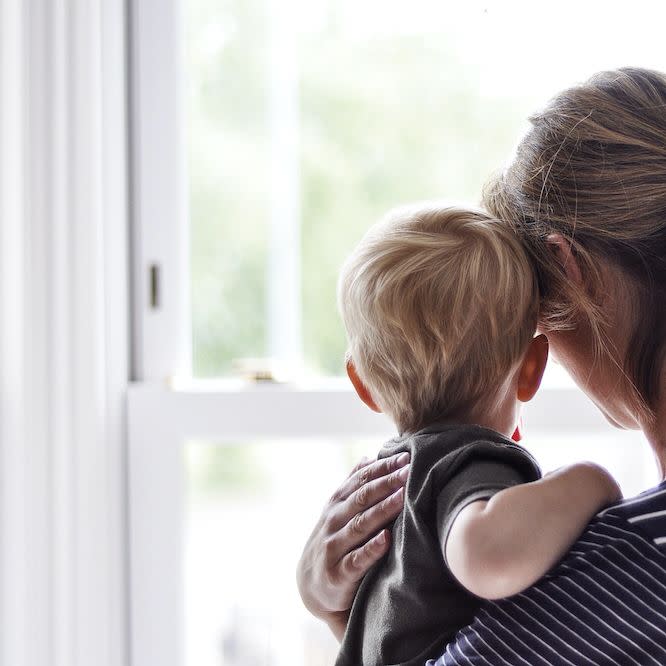Does The Government's Childcare Funding Boost Go Far Enough To Make Motherhood Viable?

Childcare costs are sky-high in the UK, with a British couple on average wages spending almost a third of their earnings on fees (twice as much as in France, and 29 times higher than Germany, where the average is just 1%). Not only does this add to an already tough economic climate for many, it acts as a barrier to entry to parenthood itself to others. Single mother of one Rebecca Cox explores what the Chancellor of the Exchequer Jeremy Hunt’s promise to pump £4bn more into the childcare system actually means for those getting left behind.
Let's face it, having a child in the UK is a privilege many can’t afford right now. A survey carried out by campaign group Pregnant Then Screwed last year showed that six out of 10 women who had an abortion in the last five years cited childcare costs as a reason for the decision to end the pregnancy. Statistics were even higher for Black women, with 76% of those asked saying the cost implications of childcare were one of the reasons for their termination. At a time where abortion rights are still on the political agenda it puts an entirely new spin on the phrase ‘cost of living’.
How can we possibly bring life into these cost-crunched lives of ours? And what is being done to tackle these barriers to entry so that starting a family, or expanding one's existing family, isn’t an option only available to the highest earners? The average cost of raising a child to 18 in the UK is between £150,000 and £200,000 or up to £900 a month. A large chunk of that goes on childcare, particularly when your children are below school age. The current choice is clear: make money or make children.
I am a single mother of one. My son is seven years old, and I’ve been separated from his dad (who I co-parent with) for six years. When I gave birth, my ex and I were the aforementioned ‘average couple on average wages’, spending a large chunk of our salaries on childcare and just getting by, making things work with help from grandparents being roped in as unpaid wraparound care to make up the days and keep costs manageable.

And then I needed to go it alone. The truth is, being a solo or single parent is almost economically impossible unless you are in the top 20% of earners. It was at the point of my son’s 30 hours of funded childcare kicking in that I was able to truly find my feet as a single parent and establish financial independence, despite the fact that I had already almost doubled my earnings by taking on new work and extra freelance projects to make the numbers work. As he’s gotten older, I’ve increased my workload further still, and earned a promotion at my main magazine job, where I work four days a week. And yet, with all this privilege, I could never afford to have another baby as things stand. With nobody to share the burden of cost with, funding childcare alone would be impossible alongside rising costs in all other areas of life. Did I always imagine my son growing up with a sibling? In truth, yes. Have I even allowed myself to consider the possibility? In the current climate, no.
Hunt’s plan to extend the funded childcare provision to one and two year-olds would, then, on paper, be the lifeline that parents and would-be parents have been waiting for. A slither of hope in one of the bleakest economic (and, let’s be honest, social, environmental, and personally, romantic) landscapes of all time. Alas, the originally reported 30 additional hours has some caveats. The help will come in two stages, with eligible working parents receiving 15 hours of free childcare for two year olds from April 2024 (one year’s time), nine month olds to two year olds from September 2024 (a year and a half from now) and the originally mentioned 30 hours of free childcare for all under fives coming in two and a half years years in September 2025.
Why the wait? To put it simply, it will take a lot more cash, and a lot more time, to fix the system. Speaking to Sky News earlier this week, Labour MP Stella Creasy compared Hunt's budget announcement to the Help To Buy mortgage scheme saying: ‘The problem is, it will stoke demand without providing the supply.’ The business group CBI calculated a necessary figure of £9 billion, more than double Hunt’s promised total injection. She even warns that this might make things worse, not better: ‘This government could end up crashing the childcare system just as they crashed the economy’.
Don’t pop the champagne yet - if the funding isn’t there to cover real cost of free places at any age of kid in nurseries then all it will do is stoke demand not help supply. That could actually crash the existing system making places harder to come by or pay for at all! pic.twitter.com/YxhhYdNX3l
— stellacreasy (@stellacreasy) March 15, 2023
In a statement responding to the announcement, campaign group Pregnant Then Screwed founder and CEO Joeli Brearley said: ‘Without a workforce plan providers will continue to be forced to close, and increasing ratios will be detrimental to staff retention, what they need is better pay which will come from significant investment into the sector and into the roll out of the free hours scheme.’
In short: giving gift vouchers to a business that’s gone bust won’t get us very far. And for parents facing the impending arrival of children or desperately awaiting change so they can start a family of their own, they must wait for said vouchers and hope the business gets back on its feet in the next couple of years so they can spend them. Which, as I write this on a day I’ve walked 10km across London to navigate tube strikes to get home to my son whose teachers are striking (with my support), feels somewhat unlikely.

The alternative is more parents (predominantly mothers) dropping out of the workforce to raise children. This is bad for women and, as the government recognises but fails to sufficiently address, bad for the economy. It is half a measure of help, a ‘buy yourself something pretty’, a passing back to the individual the weight of making things add up when increasingly they just quite clearly do not. And women will continue trying to make it work, they will continue to carry the weight of the extra bit not covered, because there is no alternative. One in five families is headed by a single parent, and 90% of these are headed by women. A new report from the Single Parent Rights Campaign of 1,000 single parents showed that almost 90% report a lack of flexible working and affordable childcare as key barriers to entering the workforce. In contrast, the same issues are key barriers to childless women wishing to enter motherhood alone. There’s no way out, there’s no way in.
This week's headlines might read like a flicker of hope on the horizon to would-be parents, struggling families, single parents desperate to get back to work or single mothers-of-one, who thought maybe, just one day, they’d make it two. But read between the lines and it’s just another piece of paper over a (increasingly and alarmingly large) crack. Still wondering whether a woman can have it all? Most of us simply can’t afford it, pre or post-budget announcement.
You Might Also Like


